As Americans make a messy exit from Afghanistan after 20 years, our messy entry in 2001 has been largely erased. The distorted official narrative and media coverage of the case of John Lindh has never been corrected, and most Americans falsely believe that Lindh was a traitor who killed a CIA agent.
This important 2013 interview with John Lindh’s father, Frank, details his conversion to Islam, and explains how John wound up in Afghanistan as a member of a Taliban-controlled force that was fighting the warlords of the Northern Alliance and their role in the drug trade. In the 11+ years of the PBC Podcast, this episode was the single-most-downloaded show, with well over 1 million downloads.
This re-posting was prompted by a false claim about John Lindh that was published in a front-page story in the Marin Independent Journal on August 22, 2021; it said that Lindh had “left Marin County to train for jihad with Osama bin Laden”. If you read the podcast notes and listen to the interview, you will understand why the claim is not true.
Here is the text from the original podcast post:
In the hysteria following 9/11, John Lindh was captured in Afghanistan and falsely accused of being a traitor. In this moving, in-depth interview, his father, Frank, details his young son’s odyssey that led to a 20-year prison sentence for “Detainee 001” in Bush’s “war on terror”.Frank Lindh is an attorney and law school instructor and the father of 3 children. His middle son, John, converted to Islam as a teenager and pursued language and religious studies in Yemen and Pakistan before he went to Afghanistan in the summer of 2001.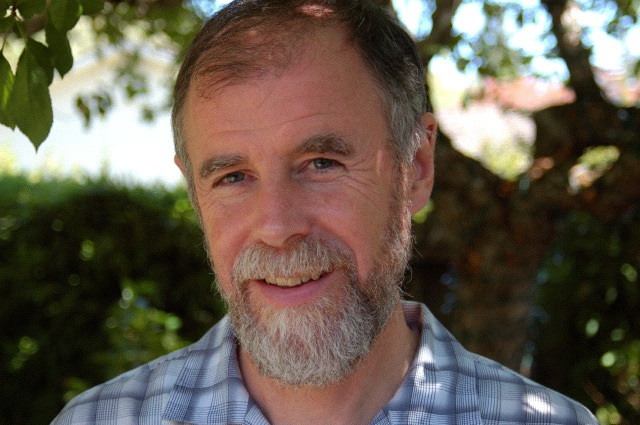
We open with the key questions related to perceptions of John Lindh: did he have a role in the death of CIA agent Johnny Mike Spann? Was John a traitor? Was he a supporter or member of al Qaeda?
From there, Frank sketches his son’s history: growing up in Marin County, California; after seeing the film Malcolm X, he converted to Islam at the mosque in Mill Valley; with support from his parents, he went to Yemen, then Pakistan, to study Arabic and the Koran. Frank wrote a detailed article about John that is the basis for the narrative in this interview.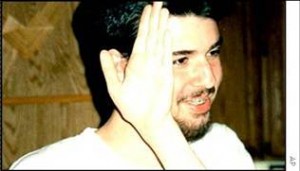
In late Spring, 2001, John told his parents from Pakistan that he was going into the mountains to escape the summer heat. He did not tell them he had joined the army of the Afghan government, then run by the Taliban and supported by the US.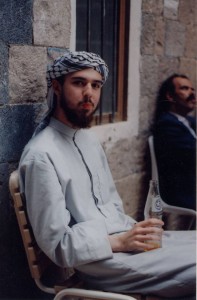
John trained at an Afghan military camp that was funded by Osama bin Laden, and actually met bin Laden (and didn’t like him or respect him). He knew nothing about al Qaeda or the 9/11 plotting, and was in a remote corner of Afghanistan fighting the warlords of the Northern Alliance in November, 2001. John knew nothing of the geopolitical changes: that the US now considered the Taliban an enemy and the warlords as allies.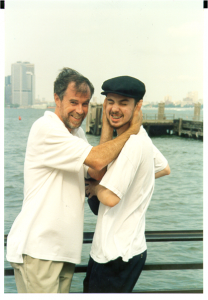
As Frank relates, John’s unit was captured by the brutal warlord Dostum, whose practice was to torture and kill prisoners. In Mazar-i-Sharif, John was questioned by CIA agent Spann, but remained mute as he did not know who to trust and thought Spann might be a mercenary working for Dostum. John was shot in the leg during a skirmish, and was unarmed, kneeling in a pasture when Spann was killed. Then the warlord’s guards tried to slaughter the prisoners, and John was wounded in his right thigh. John pretended to be dead, then crawled into the infamous pink building where he endured grim conditions for several days. Out of 400 troops, he was one of 86 survivors.
The Red Cross arrived, and took the survivors to a prison hospital in Sheberghan, where John was interviewed over his objections by CNN, even as he was receiving morphine. This produced the photo that Newsweek used for a cover story tagging John as “American Taliban”.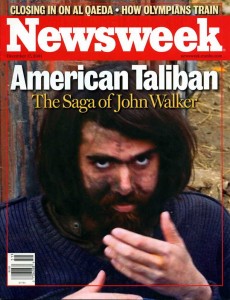
Frank recounts how he first learned that it was his son who had been captured, and the stream of false accusations that came from Bush, Rumsfeld and the US media. He talks about John’s brutal treatment, including being stashed in a shipping container and being harshly interrogated.
In this toxic atmosphere, attorney James Brosnahan prepared for a trial scheduled for the one year anniversary of 9/11. Frank notes that in 2002, polls showed that all Americans knew John Lindh’s name, almost all thought he was guilty–but Republicans wanted him executed while many Democrats called for life in prison.
All of the outrageous charges were dropped, and John entered a guilty plea to a single count of violating economic sanctions. That law has a max 10 year sentence, but was doubled based on a charge that John had carried a weapon.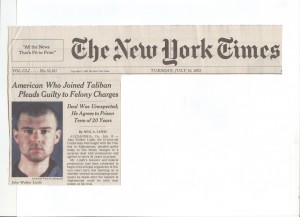
Frank describes John’s life in prison, where he writes poetry and has filed a successful lawsuit to permit him and other Muslims to pray together 5 times a day. And he says that John’s not bitter, and neither is he.
Here is a link to read some poems that John Lindh has written in prison under the name Abu Sulayman. His address is also listed, in case you’d like to write to him.
Podcast: Play in new window | Download
Subscribe: RSS